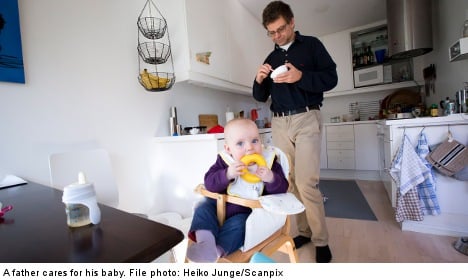In August fathers represented a third of those on parental leave compared with 20 percent in December.
Paternity leave researcher Roger Klinth said the figures suggest that women are still the primary carer in the family with fathers taking control over when to take up their leave.
“Dad is more of a bonus figure and can come in when it suits him. It reflects a deeper pattern of who gets to choose and who get the remainder,” he told the TT news agency.
The numbers are a big increase compared to the early 90s when fathers made up just 10 percent of parents taking up paternity leave. To combat this the social insurance office launched a number of schemes to even out the balance like suggesting prolonging holidays with pappeledigt.
“This encouraged men to do exactly as the patterns are demonstrating,” said Klinth who is a professor of gender studies in Linköping university.
In total men’s overall use of paternity leave has grown to almost a quarter. Much of that is attributed to the mandatory two Dad months which was a key component of balancing out the leave among both parents.
Klinth added that he expects fathers to take up more parental responsibility in the future. He suggested that the leave should be broken up into three parts, one for each parent and one to be used as the family wishes.
“That would be a good compromise and a clear indication that the responsibility is expected to be shared.”
TT/The Local/pr




 Please whitelist us to continue reading.
Please whitelist us to continue reading.
Member comments